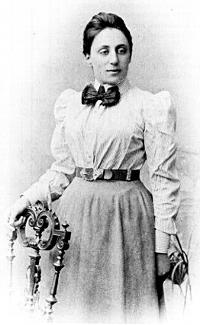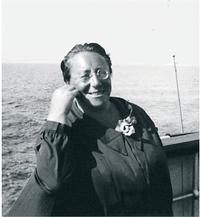If you don't know the name Amalie Emmy Noether, you're not alone. Suffice to say, she was and remains one of the greatest minds of the 20th century.
Read on to learn more about this remarkable woman as we wrap up Women's History Month 2018...
-
Emmy Noether (pronounced NER- ter) was a mathematician who formulated an underlying theorem for most of modern physics, including general relativity, mechanics, field theory, quantum mechanics, and particle physics.
-
"Noether’s Theorem is to physics what Natural Selection is to biology or Moore’s law is to technology.” (Dr. Katy Mack, astrophysicist)
-
Noether was born in Erlangen, Germany in 1882, into a mathematical family. Her father, Max, was a math professor at the University of Erlangen and her brother, Fritz, was a mathematician as well. But girls were not allowed to attend college preparatory schools and Emma went to “finishing school,” graduating in 1900 with a certificate that qualified her to teach French and English. This was not at all what she wanted. She was determined to study math.
-
Women were not allowed to enroll in universities but could audit courses with permission of the professor and Noether audited courses in mathematics at the University of Erlangen, where her father taught. In 1902-04 she did the same at University of Gottingen, where she studied with David Hilbert and Felix Klein, two of the most influential mathematicians of the time. In 1904 Erlangen changed the rules to allow women to matriculate and Noether returned there to become one of two women among thousands of male students. She was awarded a Ph.D, summa cum laude, in 1907. Even with a Ph.D. women were not allowed to teach at universities but Noether remained at Erlingen as an unpaid researcher, taught some of her father's classes and advised his doctoral students.
-
In 1915, Einstein published his theory of general relativity. It attracted a great deal of attention in the physics world, but no one really understood how it worked. Hilbert and Klein invited Noether to come to Gottingen to help them explore it. Shortly after her arrival, she developed Noether's Theorem.
-
“For two of the most significant sides of the general theory of relativity she gave at the time, the genuine and universal mathematical formulation.” (Hermann Weyl, noted German-American mathematician)
-
Noether's colleagues tried to get her a paid teaching position at Gottingen. Hilbert fought for her, telling the administration “I do not see that the sex of the candidate is an argument against her. After all, we are a university, not a bathhouse.“ But he was unsuccessful and she remained an unpaid "guest lecturer" on Hilbert's staff for many years. Finally, in 1922, she became an "associate professor without tenure" and earned a small salary. Her brilliance attracted gifted math students from all over Europe who became known as "Noether's Boys". Unfortunately, her research was published under the names of colleagues and students, rather than her own.
-
"Emmy Noether was one of the most influential mathematicians of this century. The development of abstract algebra, which is one of the most distinctive innovations of twentieth-century mathematics, is largely due to her… " (Nathan Jacobson, celebrated algebraist)
-
In 1932, Noether was awarded the Ackermann-Teubner Memorial Prize in mathematics. She was then asked to give the plenary lecture at the International Mathematics Congress in Zurich. (It would be almost 60 years before another woman had this opportunity.) Things were looking up.
-
8 months later, Noether was fired from Gottingen because she was a Jew. With the help of Einstein and others she was given a visiting professorship at Bryn Mawr College, here in Pennsylvania. She was also invited to do research and give a weekly lecture at the Institute for Advanced Study in Princeton, where Einstein had settled.
-
"Noether’s Theorum allowed the conception of the Higgs-Bosun decades before it was found in the Large Hadron Collider.”(Dr, Katy Mack, astrophysicist)
-
18 months after her arrival in the US, at the age of 53, Noether suffered an ovarian cyst and died from complications of surgery. Her remains are buried on the Bryn Mawr College campus.
-
"In the judgment of the most competent living mathematicians, Fräulein Noether was the most significant creative mathematical genius thus far produced since the higher education of women began“ (Albert Einstein)
You can read more about Emmy Noether and her scientific and mathmatical contributions to our world through our catalog and databases.
Have a question for Free Library staff? Please submit it to our Ask a Librarian page and receive a response within two business days.



